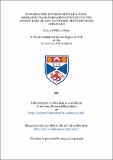Towards the development of a gene-mediated transformation system for the potato late blight pathogen Phytophthora infestans
Abstract
The aims of this project were to develop the necessary techniques and components for achieving gene-mediated transformation in Phytophthora infestans. Protoplasting and regeneration procedures were developed for encysted zoospores and sporangia. The presence of CaCl2 in the protoplasting osmoticum was found to increase regeneration frequencies to over 90% and 70% for cyst and sporangial protoplasts respectively. Published methods for mycelial protoplasts were improved to give regeneration frequencies of 25-30%. Attempts were made to develop repair of uridine auxotrophy as a transformation marker but isolation of uridine auxotrophs by positive selection with 5-fluoro-orotic acid and filtration enrichment was unsuccessful. Various antibiotics were tested on three isolates of P. infestans for their suitability as potential transformation selection agents. Hygromycin B, G-418 and phleomycin were found to give clean backgrounds at low concentrations. Genes encoding resistance to these antibiotics and placed under the control of a variety of fungal, bacterial and viral transcription control sequences were used in transformation experiments employing CaCl2/PEG treatment, lithium acetate/PEG treatment and electroporation to introduce the plasmid DNAs into cyst, sporangial or mycelial protoplasts. No unequivocal evidence for transformation was obtained. To circumvent the possibility that failure to generate transformants using these plasmids was due to non-recognition of the heterologous promoter/terminator sequences P. infestans genes were isolated from a gene library. Two different actin genes (actA and actB) and one glyceraldehyde-3-phosphate dehydrogenase gene (gpd) were characterised. All three genes are actively transcribed in mycelia but only at a low level in the case of actB. actA and actB have CCAAT motifs in their 5' noncoding regions but lack introns in their coding regions. The actins encoded by actA and actB are highly diverged from actins of other eukaryotic microbes suggesting the evolutionary lineage of the Oomycetes is distinct from that of the higher fungi. All three genes, but especially actA are strongly biased in their codon Usage, a feature of highly expressed genes in other eukaryotes. The promoters of actA and gpd seem suitable for directing expression of hybrid selectable marker genes.
Type
Thesis, PhD Doctor of Philosophy
Collections
Items in the St Andrews Research Repository are protected by copyright, with all rights reserved, unless otherwise indicated.

